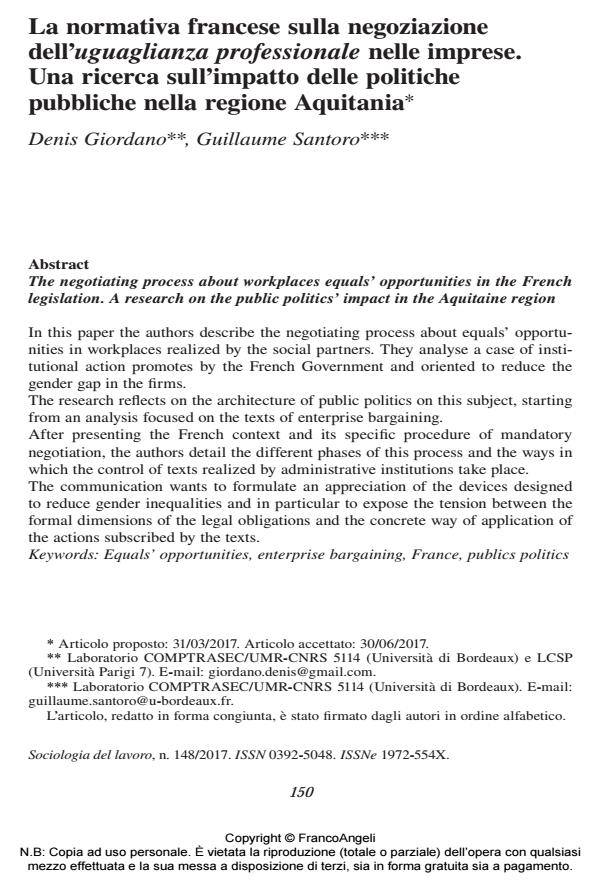The negotiating process about workplaces equals’ opportunities in the French legislation. A research on the public politics’ impact in the Aquitaine region
Journal title SOCIOLOGIA DEL LAVORO
Author/s Denis Giordano, Guillaume Santoro
Publishing Year 2017 Issue 2017/148
Language Italian Pages 17 P. 150-166 File size 116 KB
DOI 10.3280/SL2017-148009
DOI is like a bar code for intellectual property: to have more infomation
click here
Below, you can see the article first page
If you want to buy this article in PDF format, you can do it, following the instructions to buy download credits

FrancoAngeli is member of Publishers International Linking Association, Inc (PILA), a not-for-profit association which run the CrossRef service enabling links to and from online scholarly content.
In this paper the authors describe the negotiating process about equals’ opportunities in workplaces realized by the social partners. They analyse a case of institutional action promotes by the French Government and oriented to reduce the gender gap in the firms. The research reflects on the architecture of public politics on this subject, starting from an analysis focused on the texts of enterprise bargaining. After presenting the French context and its specific procedure of mandatory negotiation, the authors detail the different phases of this process and the ways in which the control of texts realized by administrative institutions take place. The communication wants to formulate an appreciation of the devices designed to reduce gender inequalities and in particular to expose the tension between the formal dimensions of the legal obligations and the concrete way of application of the actions subscribed by the texts.
Keywords: Equals’ opportunities, enterprise bargaining, France, publics politics
- Becker M., Derrin-Cortés C. (2014). La négociation collective sur l’égalité professionnelle dans les entreprises entre 50 et 300 salariés en 2012 et 2013. Rapporto del consiglio superiore sulle pari opportunità.
- Bevort A., Jobert A. (2011). Sociologie du travail: les relations professionnelles. Parigi: Armand Colin.
- Bifulco L. (2005). Le politiche sociali. Temi e prospettive emergenti. Roma: Carocci.
- Brunet S., Dumas M. (2012). Bilan de l’application des dispositifs promouvant l’égalité professionnelle entre femmes et hommes, rapporto CESE.
- Bucher A., Forté M., Garat T., Moizard N., Terraz I., Tournadre F. (2015). Négocier l’égalité professionnelle entre les femmes et les hommes: Avancées, résistances et conditions de développement, rapporto per Direccte Alsazia.
- Commaille J. (2001). Les injonctions contradictoires des politiques publiques à l’égard des femmes. In: Laufer J., Marry C., Maruani M., a cura di, Masculin, féminin. Questions pour les sciences de l’homme. Parigi: PUF.
- Cristofalo P. (2014). Négocier l’égalité professionnelle: de quelques obstacles à la prise en charge syndicale de la thématique. Nouvelle revue de psychosociologie, 2: 133-146.
- Dugué B. (2005). Le travail de négociation. Regards sur la négociation collective d’entreprise. Tolosa: Octarès.
- Giordano D., Santoro G. (2017). La négociation collective relative à l’égalité professionnelle: une trajectoire de pouvoir dans les politiques sociales entre incitations législatives et pratiques d’application. Paper pubblicato tra gli atti del convegno AFS, Amiens: f.hypotheses.org/wp - https://rt6.hypotheses.org/777.
- Groux G. (2005). L’action publique négociée. Un nouveau mode de régulation? Pour une sociologie politique de la négociation. Négociations, (1): 57-70.
- Hassenteufel P. (2011). Sociologie politique: l’action publique. Parigi: A. Colin.
- Hobson B., a cura di (2013). Worklife balance: The agency and capabilities gap. Oxford: OUP.
- Junter A. (2004). L’égalité professionnelle entre les femmes et les hommes: une exigence politique au coeur du droit du travail. Travail, genre et sociétés, (2): 191-202.
- Junter-Loiseau A. (1996). L’égalité professionnelle dans la négociation collective. Rapporto per la Fondazione di Dublino per il miglioramento delle condizioni di vita e di lavoro.
- Lascoumes P., Le Galès P. (2007). Sociologie de l’action publique. Parigi: Armand Colin.
- Laufer J. (2014). L’égalité professionnelle entre les femmes et les hommes. Parigi: La Découverte.
- Lippi A. (2007). Valutazione delle politiche pubbliche. Bologna: il Mulino.
- Maruani M. (2010). Les nouvelles frontières de l’inégalité: hommes et femmes sur le marché du travail. Parigi: La Découverte.
- Maruani M., a cura di (2013). Travail et genre dans le monde, l’état des savoirs. Parigi: La Découverte.
- Mias A. (2014). Entre complexification et simplification du travail de négociation. L’ambivalence des pratiques de connaissance en entreprise. Nouvelle revue de psychosociologie, 2: 41-53.
- Mias A. (2017). Quelles négociations collectives dans les entreprises? Revue du droit de travail, 5: 316-323.
- Milewski F., Sénac R. (2014). L’égalité femmes-hommes. Un défi européen au croisement de l’économique, du juridique et du politique. Revue de l’OFCE, 134: 201-213.
- OIT (Organisation International du Travail) (2012). L’égalité entre hommes et femmes au coeur du travail décent. Rapporto sulle convenzioni e raccomandazioni in materia.
- Pfefferkorn R. (2002). Les politiques publiques et la question de l’égalité hommes-femmes. Le cas de la France. Cahiers du genre, 1: 87-109.
- Rabier M. (2008). Analyse des accords d’entreprise portant sur l’égalité professionnelle entre les femmes et les hommes signés depuis la loi du 23 mars 2006. Rapporto DREES, SDFE.
- Santoro G. (2016). Réflexions sur l’efficacité du droit de la négociation collective sur l’égalité hommes-femmes. Droit Social, 1: 49-61.
- Silvera R. (1996). Le salaire des femmes: toutes choses inégales…: les discriminations salariales en France et à l’étranger. Parigi: La Documentation française.
Denis Giordano, Guillaume Santoro, La normativa francese sulla negoziazione dell’uguaglianza professionale nelle imprese. Una ricerca sull’impatto delle politiche pubbliche nella regione Aquitania in "SOCIOLOGIA DEL LAVORO " 148/2017, pp 150-166, DOI: 10.3280/SL2017-148009